Posts from — October 2010
The pass
Odon wanted us up and out of the first night’s camp site by 7:30AM. Most of us were up, mostly on time, the porters’ gentle tapping on our tents bringing us back from our exhausted sleep to our location on the side of the trail.
The chickens were scratching at the grass around the tents, and the mist was beginning to burn off. We all tumbled roughly out of our bags and wandered in small groups to the bathrooms, some hacking; some rubbing our eyes sleepily. Then we dressed and pulled our packs out of the tents, redistributing weight, and determining what would be carried by our hired porters. Almost the second our tents were free of gear, the porters had them broken down and packed away. Over the course of the trek we would be witness to the hyper-efficiency that had them simultaneously preparing meals, washing dishes and breaking down or setting camp. Even at our best, we were a half-step behind – simply hanging on enough to get ourselves into the meal tent.
The orange, plastic wash basins placed at the entrance to the meal tent before each meal, were filled with warm water for us to clean our hands and faces. Along with a good tooth-brushing, they provided a comfort, a sense of normalcy as we pawed our way through the mountains.
This morning, we were scheduled to officially meet the porters. Before we all shouldered our loads, we stood across from each other and shared names, professions, ages, and hometowns.
Francisco, the leader of the porters stepped forward. A man of medium-height with a mesmerizing smile and sparkly eyes, he was the representative of the group. He was also the shaman. He would make the offerings that kept our group safe on the trail. He welcomed us and turned to the other porters to introduce themselves. Along with their jobs, they told us their ages. Francisco, at 35, was the youngest. The eldest was 62. He was a tiny, wiry man who we had seen on the trail with a noticeably larger load than the others. When Odon translated this man’s introduction, he explained that the eldest of the group always carries more weight than the others, in order to show that he is still able to shoulder his load.
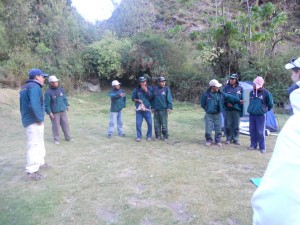
Then it was our turn. I tried my intro in Spanish, looking to Odon for the word for “writer,†and received approving smiles and nods. The porters spoke the local, ancient language, but had more Spanish than English. My effort was noticed. A lot. Francisco interrupted to ask Odon if I was married, hiding his grinning face behind one of the other giggling porters.
The introductions were completed with a cultural exchange. The porters taught each of us a phrase in their language. Things like, “How are you?†and “Don’t get tired,†were repeated as we tried desperately to memorize them.
“Odon, how do you say thank you?â€Â I wanted to be able to address our porters in their own language. Odon looked at us, and gave us the answer. It was something that sounded like “sul pie key.â€Â And then he explained that we should add “wai key†to the end, making the phrase, “thank you, brother.â€
“You see, there is no word for ‘friend.’ Everyone is a brother or a sister.â€Â Beautiful. We all practiced, committing the phrase to our deepest memories so that it wouldn’t escape as we climbed to 14,000 feet.
And that’s where we were headed: Dead Woman’s Pass at just over 14,000 feet above sea level.
“We’re walking alone today. Everyone go at your own pace.â€Â Odon had special instructions for this part of the trek. “You will get tired. It’s okay to stop. Stop as often as you’d like. Walk for 10 minutes and then stop for 10. That’s fine. But don’t sit down. Never lie down.† His face was serious. “If you do that, you won’t be able to get back up. You won’t make it to the top and we’ll have to take you back down. There’s some medical reason. I don’t know, but you need to not stop for too long. Don’t wait at the top for anyone. Just take you pictures and start down the other side.â€
This was more intense than I’d expected. He was talking about blood pooling. It made sense. We’d be a lot higher than our bodies were used to. Blood wouldn’t be pumping as well. Oxygen deprivation was a serious thing.
And with Odon’s words ringing in our ears, we struck out, through the little village, along the trail that would take us to the pass.
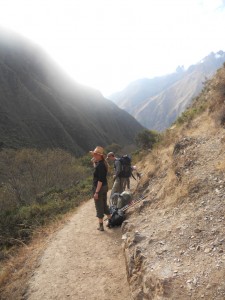
We were about an hour behind Odon’s schedule. He seemed anxious to get us moving. Even with lighter loads, this leg would be the most taxing of the week. We’d been told we’d hiking for 7 or 8 hours. Somehow, I thought this was a hyper-inflated number designed to scare us a little. It was not.
We hiked. And hiked. And hiked. And then we hiked some more, kept company by the imposing mountains, and ever climbing trail.
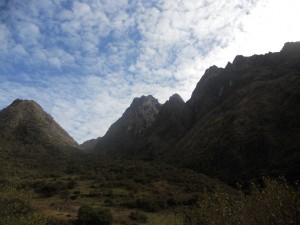
It was three hours before we had any view of the pass. Three hours of walking up the trail, climbing up the steps that seemed too large for small Inkans, three hours of stopping to breathe. When we finally saw the pass, and the line of people, like cliché ants winding their way closer, we all stopped. A bunch of us were heading up at the same pace, leapfrogging each other as we stopped to take pictures, and to suck down water from the tubes that ran over our shoulders from the bladders in our packs. The act of biting the plastic, sucking and swallowing was almost too much to do while hiking. It left me nearly breathless, struggling to catch wind while I scrambled along the path.
I gasped a little when people took off their packs and sat down. I could hear Odon. I could see the blood pooling in their legs. “Do you think we should be sitting?â€
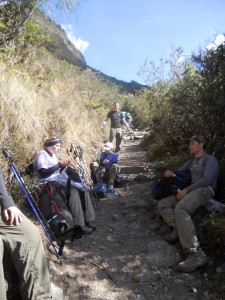
“It’s just for a minute. We’ll be fine.â€
I unclipped my pack and leaned back against the earth wall that was the side of the trail. It was the most I was willing to risk. We could see the top, and that felt good, but we were still another hour away from the last checkpoint, according to Odon. From there it would be another hour or two. I was pretty sure, by this point, that he wasn’t trying to scare us with the 7 or 8 hour number, and probably not with the blood pooling, either.
From then on, we walked for no more than 15 minutes between breaks. The air was thin. It was beginning to get cooler. And the novelty of the trail was wearing off.
The final checkpoint before the pass was in a field, high in the mountains. It sat opposite a lake. A black glass pool, rigid and vacant. The light was bright and the atmosphere strange. Some trekking companies had set their meal tents near the checkpoint. Porters rushed up and down the trail, and burners boiled water in large pots close to the ground.
I took advantage of the bathrooms here. With my pack set aside and my toilet paper in hand, I jogged into camp , past Australian trekkers on their way back from the toilets. “How are they?â€Â I tossed the obligatory question at them as I passed.  “Not bad, actually.â€Â The woman who responded was nodding in an approving way.
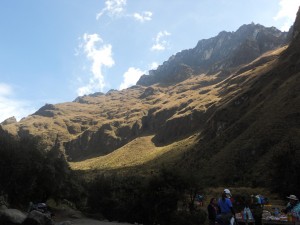
The mood in the camp was a mixture of tired and excited. We were all close. The trail runs one way, so everyone there was headed to the pass, whether under their own steam, or on the backs of the porters.
Once back on the trail, we looked up at the pass. It was right there. Right there in front of us. It looked so very close.
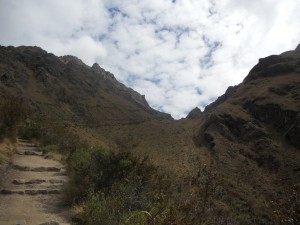
But Odon said it would take another hour and a half to get there. And it did. We were part of a line of trekkers. Most of them were traveling without packs, but moving quite as slowly as we were. It felt good to be keeping pace with them. Good emotionally, but physically I was panting open-mouthed, trying to get as much oxygen to my brain as possible.
Every so often, we’d hear “porter!†and we’d shuffle to the side of the little trail to make room for the men who were running, yes running, up the mountain with unfathomable loads on their backs.
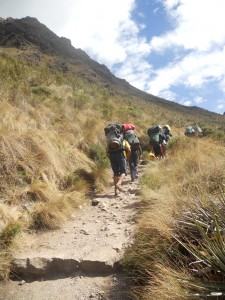
Almost all of them ran in sandals. Shoes made of old tires. The newer porters had blisters. Sometimes there was blood, and rarely it was wrapped. The older porters just had amazing calluses, whether from running the trails, or from working the fields. Most of them were farmers. They would run past us, holding the packs to their backs and disappear over the saddle of the mountain.
We knew we had reached the top, when we found a pile of backpacks and saw a large group of people sitting. The pass wasn’t the tallest peak. It was the way between the tallest peaks. Some people were climbing higher on either side, looking for a better view. Many others were sitting down, taking in the view, and hydrating for the downhill portion of the day.
It’s great when you find yourself traveling with someone who thinks the same way you do. Our moment at the top of the pass was one of those times. LeAnna and I looked at each other and silently agreed that we weren’t going to do what everyone else was doing.
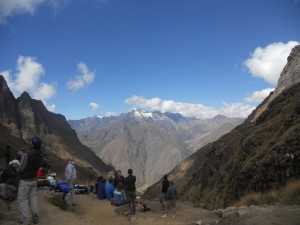
We took our pictures and then gathered our packs and hurled ourselves down the backside of the mountain. This was the perfect opportunity to get in front of the chattering, coughing, packless masses that had beaten us to the top.
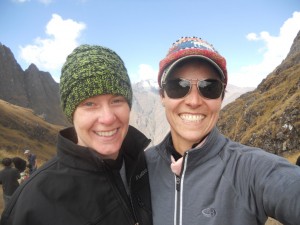
We really did hurl ourselves. Odon had mentioned that the porters run downhill, not only because they need to beat the rest of the trekkers into camp, but because it’s easier on your body to run. I’d known this to a lesser extent from running cross country in high school. But the idea of running with 30 lbs on my back was a little daunting. By this time, we trusted Odon. So we decided to give it a try. Down a gazillion rough-hewn rock steps in the middle of the Andes.
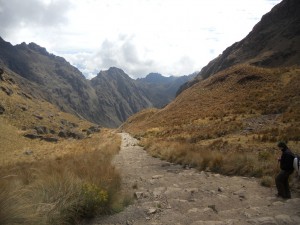
He was right. (Of course he was.) Using our walking sticks to stabilize, it was much easier. We ran, skipped, and bounced down the steps. I swear we saw almost nobody the entire 2 and a half hours we hiked down. It was blissful. The mist that was overtaking the pass was absent on the backside. The trail was open and exposed, lined with low scrub brush, which allowed us to see down into the valley where we would be making camp for the night, as well as the trail we would be taking the next day.
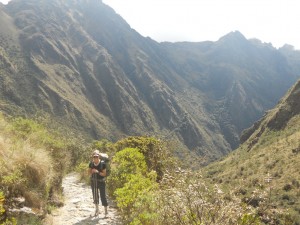
This really was one of the best parts of the trek. LeAnna and I looked around constantly, grinning and giggling. We were running the Inka Trail. We reached our camp before the rest of our group, and before most of the others on the trail. This meant a couple of things: our pick of tents for the night,
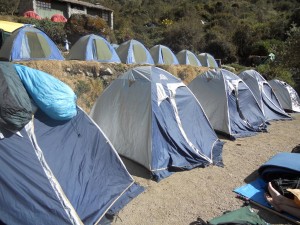
and food served to the two of us in a quiet tent.
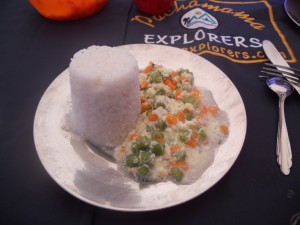
But most importantly, it meant first crack at the bathrooms.
This might sound unimportant, but when 20 women are using one toilet in the middle of the mountains, it’s critical.
We napped in our tent, while the others filed into camp. They’d waited for each other in the thin air. They ate, and we drifted in and out of consciousness. The incredible view of the clouds below us was the best entertainment we could ask for.
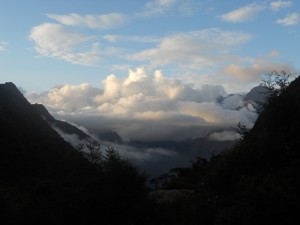
Soon enough, we were eating again. First we had “happy hour,†which consisted of popcorn, pizza, and language lessons.  Our porter, Francisco, was the only one willing to participate. We sat across from each other while our cohorts looked on. I’d point to something, say the English name, and then he’d repeat it and give me the counterpart. It took a moment before I realized he was giving me the Spanish. With a little coaxing, he translated the words into Kechua. I tried to repeat and memorize, but the clicks and creaks that came from his mouth weren’t something natural to me.
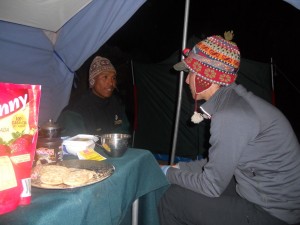
Happy Hour moved into dinner, and we all tried to stuff as many calories into our tired bodies as possible. It was our third meal in 4 hours, and the amount of food on the table let us know that we were expected to be eating a lot. Day 3 was no joke. We were facing a very long day, with climbs, and a 2,000-step descent.
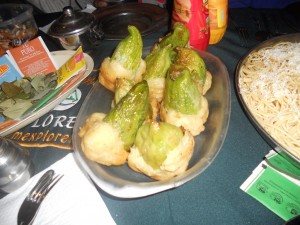
Stuffed peppers, pasta, chicken legs, soups. Odon watched us closely, asking how we each felt, and calculating how much clean water we would need for the next day. Which would begin at 6AM. Today’s late start meant that Odon would have far less patience the next two mornings. And so as the mountains went dark, we climbed into bed, our bodies grateful and our minds quiet.
October 7, 2010 1 Comment


